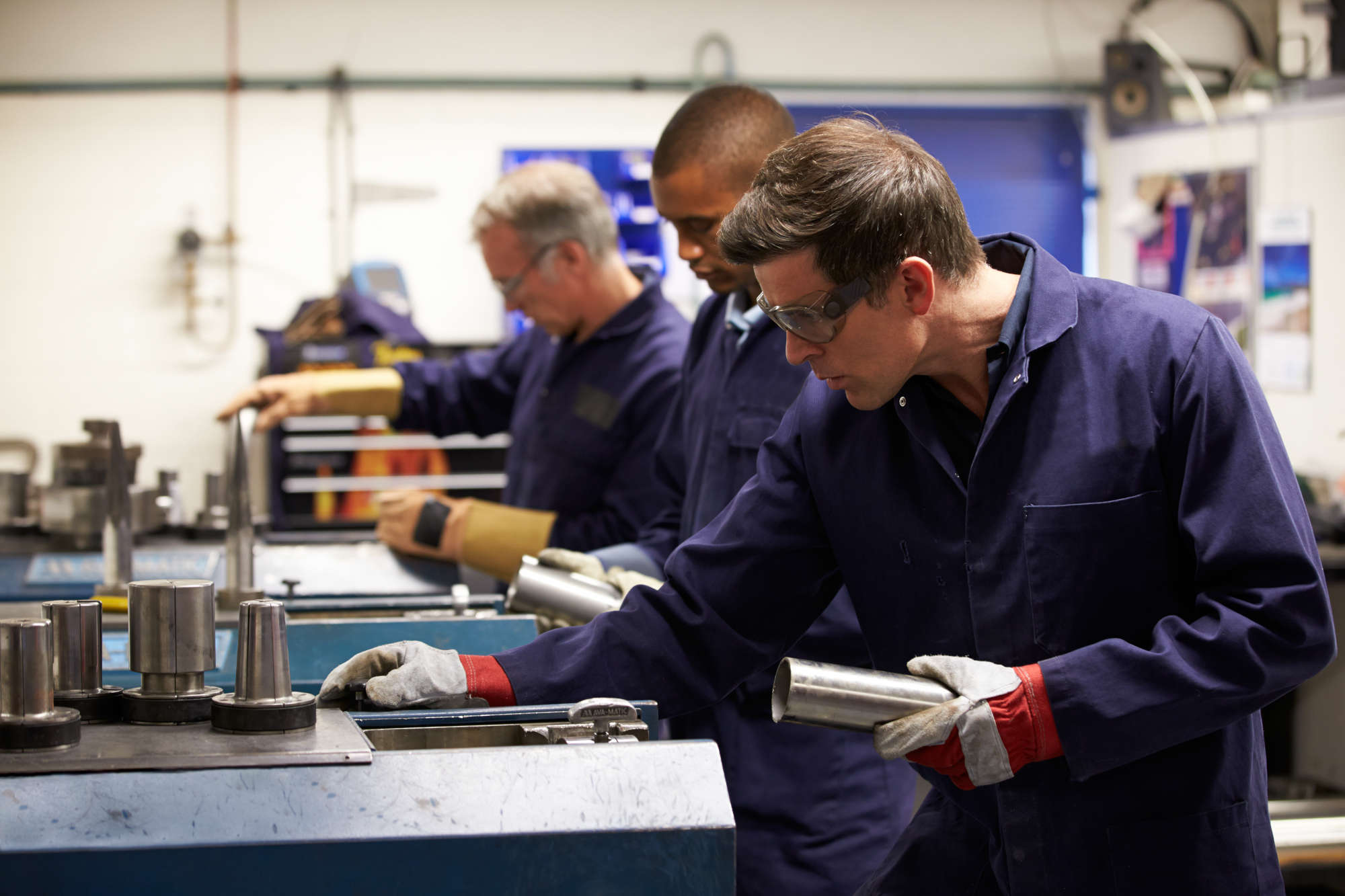What Is a Skilled Trade?

From construction and manufacturing to healthcare and hospitality, the trades are essential to keeping our society running smoothly. In this blog, we explore everything you need to know about skilled trades:
- What jobs are considered trades?
- Why are trade jobs important?
- What are the advantages of trade schools?
Finally, we share several in-demand skilled trade jobs in the U.S. and how you can find them.
What Jobs Are Considered Trades?
Trade jobs, often referred to as blue-collar jobs, are occupations that require a specialized skill learned through advanced training and hands-on experience, not a college education. Unlike white-collar jobs that typically involve office work, skilled trade jobs emphasize practical skills that are crucial for maintaining and advancing society's infrastructure and services.
Tradesmen typically learn their craft on the job or through an apprenticeship or trade school program. These are a list of modern skilled trade jobs in construction, manufacturing, and agriculture that are becoming more common in light of recent innovations and trends.
Construction
- Green Building Consultant: Recommends eco-friendly materials and energy-efficient solutions to minimize the ecological impact of construction projects.
- BIM (Building Information Modeling) Specialist: Creates 3D models for collaborative project planning and accurate representation of structures before physical construction begins.
- Solar Panel Installer: Sets up and maintains solar energy systems on buildings, contributing to the transition toward sustainable power sources.
- Smart Home Technician: Installs and configures intelligent home systems, enhancing the comfort and efficiency of residential and commercial environments.
Manufacturing
- Robotics Technician: Installs, operates, maintains, troubleshoots, and repairs robotic systems and machines.
- Additive Manufacturing Technician: Works with high-tech 3D printers and additive manufacturing equipment.
- Automation Engineer: Designs, implements, and manages the systems and processes that automate the execution of tasks.
- CNC Machinist: Operate CNC machines controlled by computer software that produce high-quality custom parts and pieces.
- Semiconductor Manufacturing Technician: Maintains and assesses equipment and the products made at a semiconductor facility.
Agriculture
- Precision Agriculture Technician: Manage farms using advanced technology to optimize crop yields through precise monitoring.
- Agricultural Drone Pilot: Uses cutting-edge drone technology for comprehensive crop monitoring, revolutionizing traditional agricultural approaches.
- Agriculture Software Developer: Design software solutions help streamline and scale farming operations, contributing to the evolution of smart farming.
- Vertical Farming Specialist: Implements and manages advanced vertical farming systems, maximizing space efficiency.
- Aquaponics Farmer: Integrates aquaculture and hydroponics to create a symbiotic system for sustainable food production, promoting eco-friendly agriculture.
The demand for trade jobs is steadily increasing, but there aren’t enough workers to meet the demand. With over 10,000 Baby Boomers turning 65 each day, there’s a shortage of younger workers entering the trades to replace them. These modern trade jobs completely transform the tradesman stereotype and can attract Gen Z.
Why Are Trade Jobs Important?
In a world that often shines a spotlight on framed degrees, skilled tradesmen built the colleges white-collar workers graduated from. These essential jobs play a pivotal part in both building and maintaining the infrastructure around us.
Tradesmen Are the Architects of Our Physical World
Construction professionals, such as carpenters, electricians, and masons, build the schools we learn in, the homes we live in, the buildings we work in, the stores we shop in, etc. But skilled labor isn't just about physical structures; it's about the connections it fosters. From the roads we drive on to the utilities that power our lives, trades create the networks that bind communities together.
Tradesmen Maintain the Lifelines of Our Society
Mechanics keep our vehicles running smoothly, ensuring that goods are transported efficiently and people can commute without a hitch. Electricians and plumbers work behind the scenes to keep our homes and offices powered and functional. These trades aren't just about fixing things; they're about preserving the seamless flow of our daily lives.
Tradesmen Are Essential to the Economy
The COVID-19 pandemic brought the world to a standstill, but amid the chaos, trade jobs stood tall as pillars of resilience. Deemed essential, these professions continued to operate even during lockdowns. The pandemic underscored the indisputable importance of trades, showcasing their importance in the face of unprecedented challenges.
The interconnected web of skilled trade jobs sustains and enhances our way of life. Tradesmen are truly the unsung heroes who keep our communities thriving.
What Are the Advantages of Trade Schools?
Let’s take a look at some trade school benefits for those who want to pursue a non-traditional career path.
Faster Entry Into the Workforce
Trade school programs are typically shorter in duration compared to traditional four-year college degrees. This means that graduates can enter the workforce sooner, start earning, and gain valuable on-the-job experience while their counterparts in traditional education are still studying.
Cost-Effectiveness
Trade school programs are often more cost-effective than traditional college degrees. With shorter durations and a focus on practical skills, students incur less student debt, making trade schools an attractive option for those looking to gain marketable skills without a significant financial burden.
High-Demand Skills
Many trade schools tailor their programs to meet the demands of industries with a shortage of skilled workers. Graduates often find that their specialized skills are directly applicable to market needs, increasing their employability. Having in-demand skills also means they will likely land a lucrative trade job.
Cutting-Edge Technology
Whether it's learning the latest construction software, mastering advanced manufacturing machinery, or understanding the intricacies of smart factory systems, students in trade schools gain a valuable edge by being well-versed in the innovative technologies shaping the future of their industries.
Hands-On Learning
Trade schools prioritize hands-on learning experiences, allowing students to apply theoretical knowledge directly to real-world scenarios. This practical approach not only enhances learning but also better prepares students for the challenges they'll face in their chosen professions.
Industry Connections
Trade schools often have strong connections with industries relevant to their programs. This can lead to valuable networking opportunities, internships, and job placement assistance, giving students a head start in building their professional careers.
Flexibility
Many trade schools offer flexible schedules, including evening classes or online options, making it easier for individuals with other commitments, such as work or family responsibilities, to pursue education and training in their chosen field.
Job Security
The trades are full of jobs that will always be needed. We can’t exist in modern America without running water, highways, buildings, electricity, etc. These fundamental aspects of society rely on skilled workers, and always will, making trade jobs increasingly secure.
Now that we’ve listed various trade school benefits, you may wonder, “What are good trades to learn, and how do I find one?”
Find In-Demand Skilled Trade Jobs
Given the labor shortage, virtually all skilled trades are in high demand. Whether you’re an experienced tradesman looking for in-demand skilled trades jobs or exploring the trades as an alternative career option, contact Skillwork.
As America’s premier skilled labor travel staffing company, Skillwork plays a crucial role in connecting tradesmen with skilled trades jobs across the country. We act as a bridge, ensuring that employers find the right talent and workers access rewarding job opportunities.
Apply now to get in touch with a Skillwork recruiter and learn about available skilled trade jobs today.


